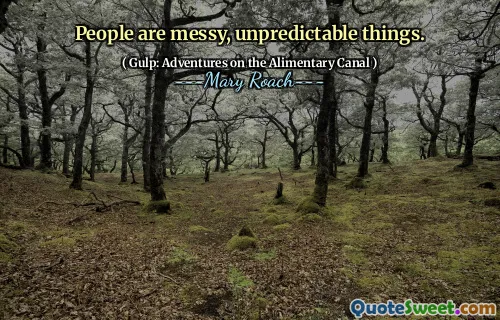Rawson has an idea of what it is like to eat without perceiving tastes, because she has talked to cancer patients whose taste receptors have been destroyed by radiation treatments. The situation is well beyond unpleasant. Your body is saying, 'It's not food, it's cardboard,' and it won't let you swallow. No matter how much you tell your brain that you need to eat to survive, you'll gag. These people can actually die of starvation.
In her book "Gulp: Adventures on the Alimentary Canal," Mary Roach explores the profound impact of taste on the act of eating, particularly through the experiences of cancer patients who have suffered damage to their taste receptors due to radiation therapy. Rawson shares insights from her conversations with these individuals, illustrating the distressing challenge they face when their bodies reject food, perceiving it as unpalatable and akin to cardboard. This disconnect between the body's response and the brain's need for nourishment creates a terrifying predicament.
These patients find themselves in a desperate situation where, despite understanding the necessity of eating for survival, they are physically unable to do so due to their altered taste perception. The psychological and physiological struggle can lead to severe consequences, including starvation, highlighting the essential role that taste plays in the overall process of eating and digestion. Roach's exploration underscores how taste is not merely a preference but a vital component of our relationship with food.






